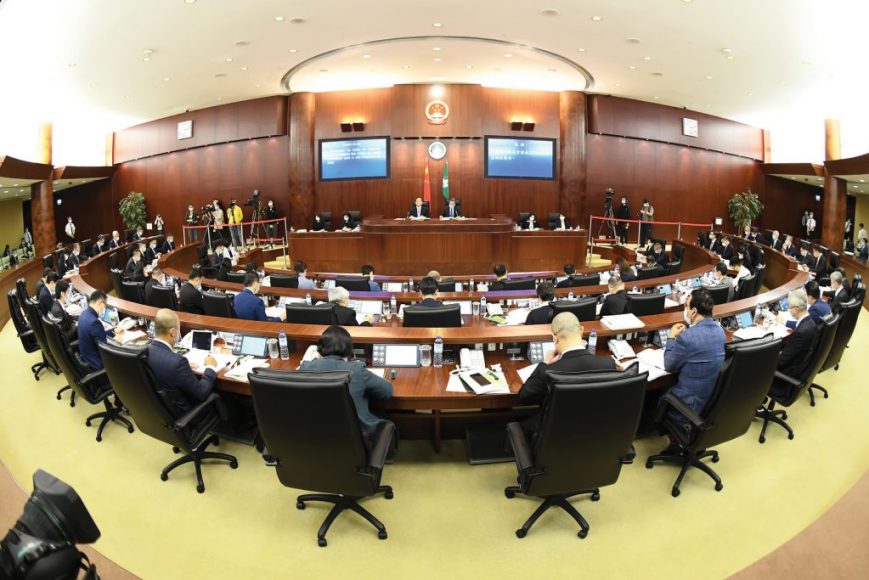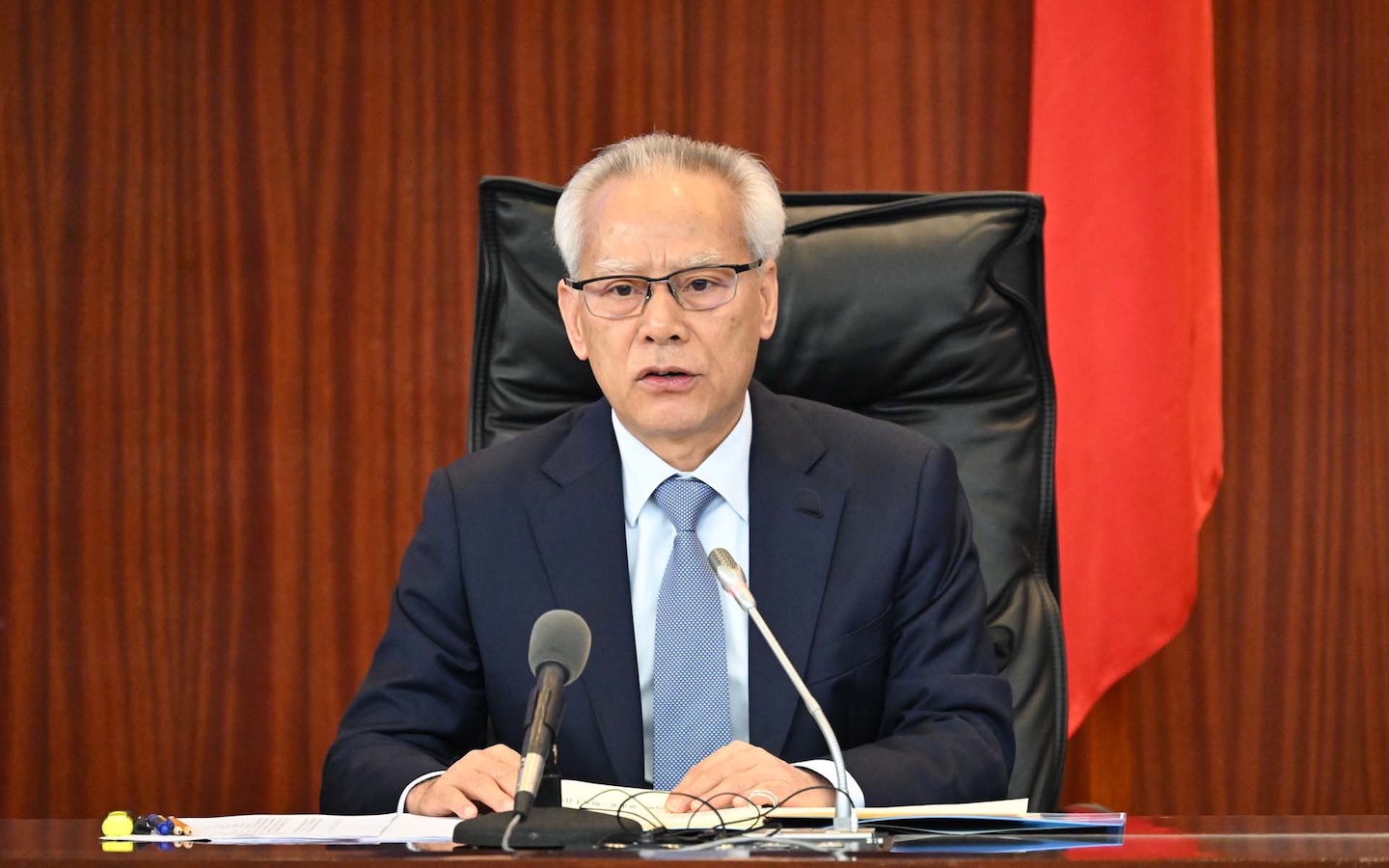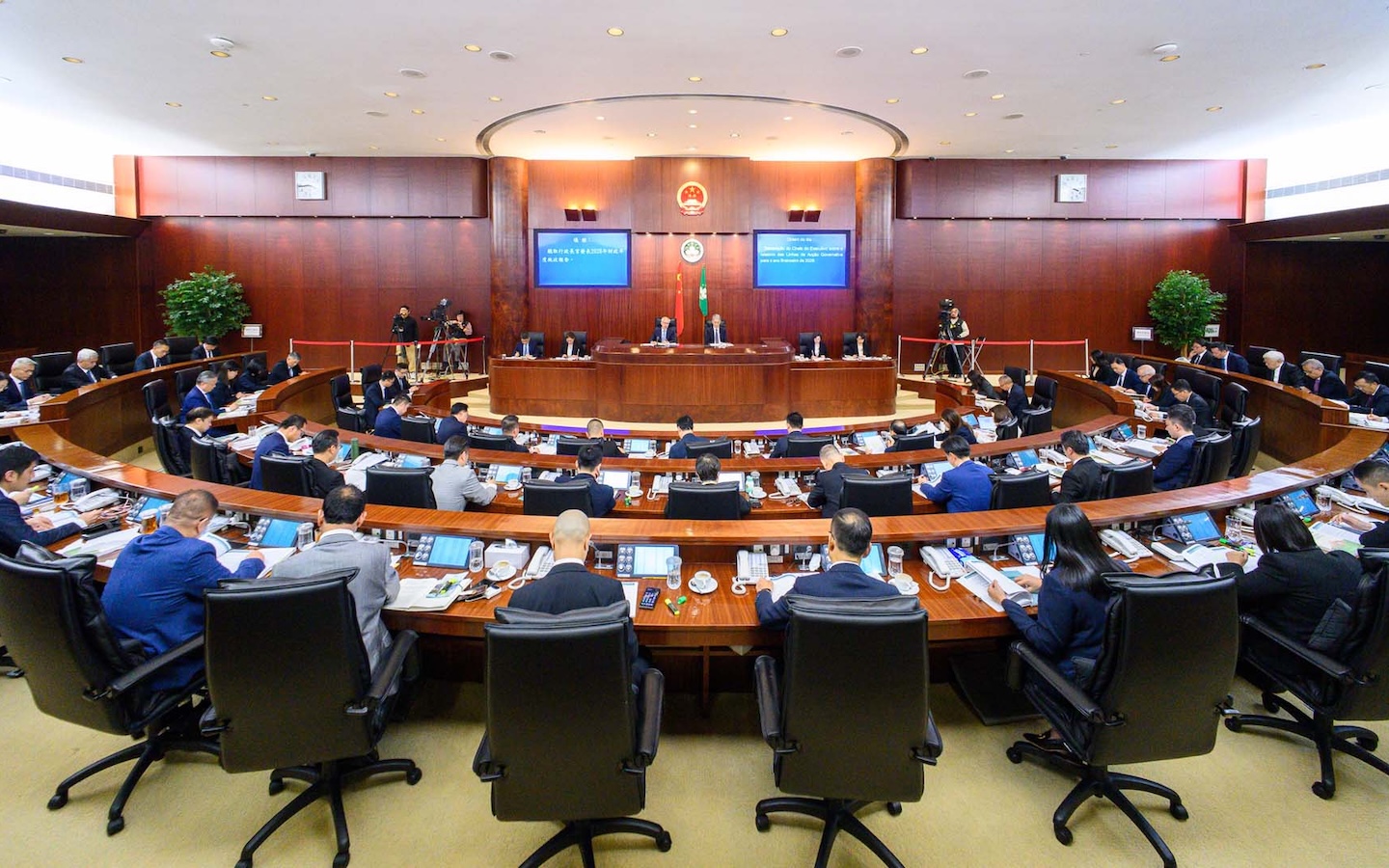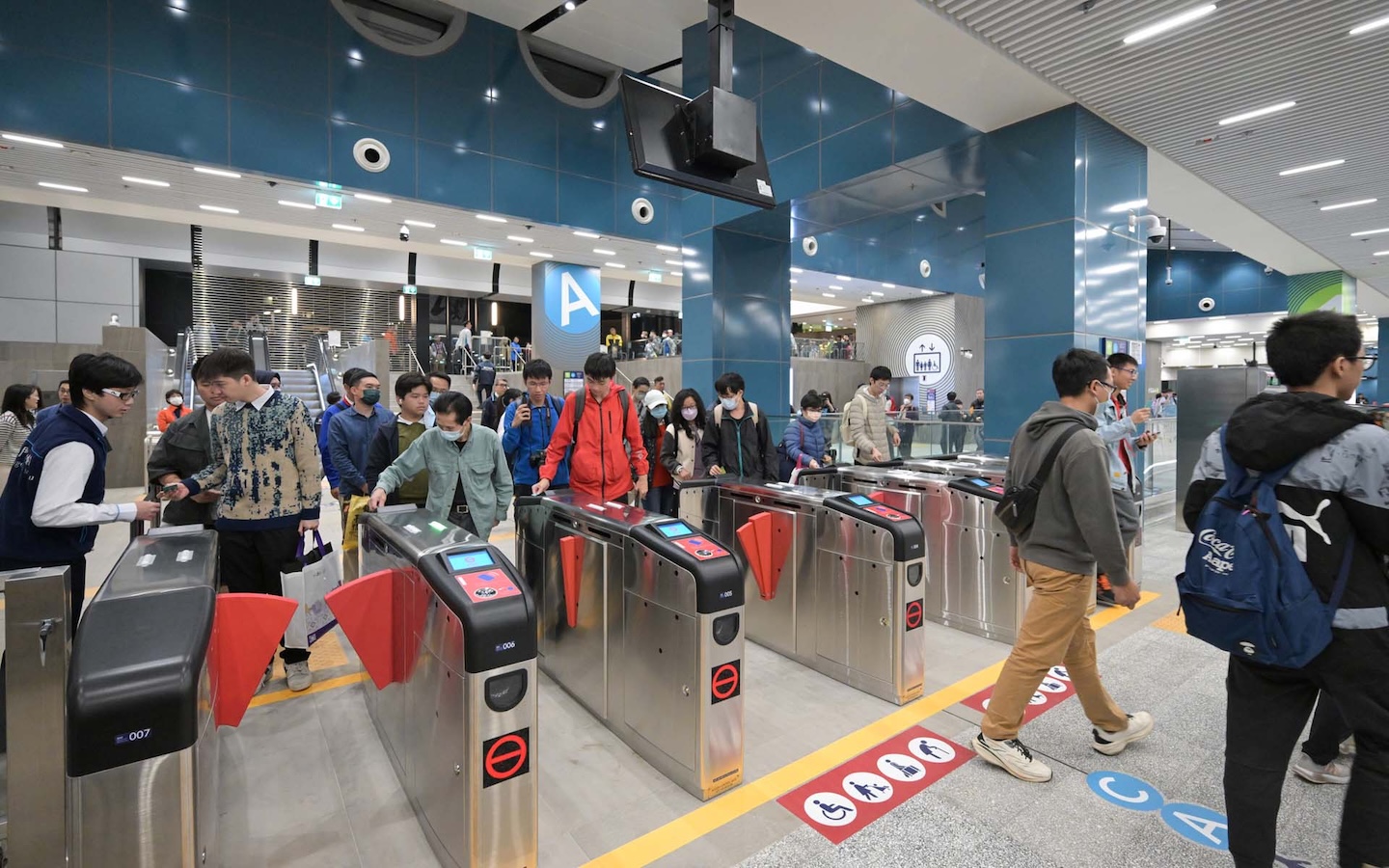TEXT Christian Ritter and Gonçalo César de Sá
Chief Executive Ho Iat Seng announced a raft of policies to stabilise and stimulate the economy and to fast-track infrastructure projects and institutional reform at his 2020 policy address last month. He also said Macao is heading for its ‘golden years’.
On 20 April, Macao’s Chief Executive Ho Iat Seng delivered his first policy address at the Legislative Assembly, exactly four months after taking office on 20 December. It was an address that carried great importance as the city waited to see what he would say about the government’s plans to get Macao back on its feet in the wake of the COVID-19 pandemic and the effect the virus has had on the territory.
COVID-19 was at the heart of Ho’s policy address. He said that the outbreak had brought severe challenges to the local government and to Macao’s society, but he also said that the government had nevertheless given top priority to the safety and health of Macao’s residents and had implemented a raft of measures to prevent and control the spread of the disease. As a result, he said that his government is putting forward a series of additional measures, such as reducing taxes and fees, implementing public and infrastructure programmes and supporting small and medium-sized enterprises (SMEs), to ensure sufficient supply for people’s livelihoods and employment, as well as the stabilisation of the economy.
Also at the address, Ho called on his government and all sectors to have more confidence and to stay focused to cope with the existing difficulties and challenges. The Chief Executive vowed to firmly implement the policy of ‘One Country, Two Systems’ and ‘Macao people governing Macao’ with a high degree of autonomy and to safeguard the authority of the country’s Constitution and the Macao Basic Law, as well as the central government’s overall jurisdiction over the SAR. Ho stressed that there is no home without a state and there is no Macao Special Administrative Region without the People’s Republic of China. “We need to pay attention to national security at all times,” he said. “It is a long-term job.”
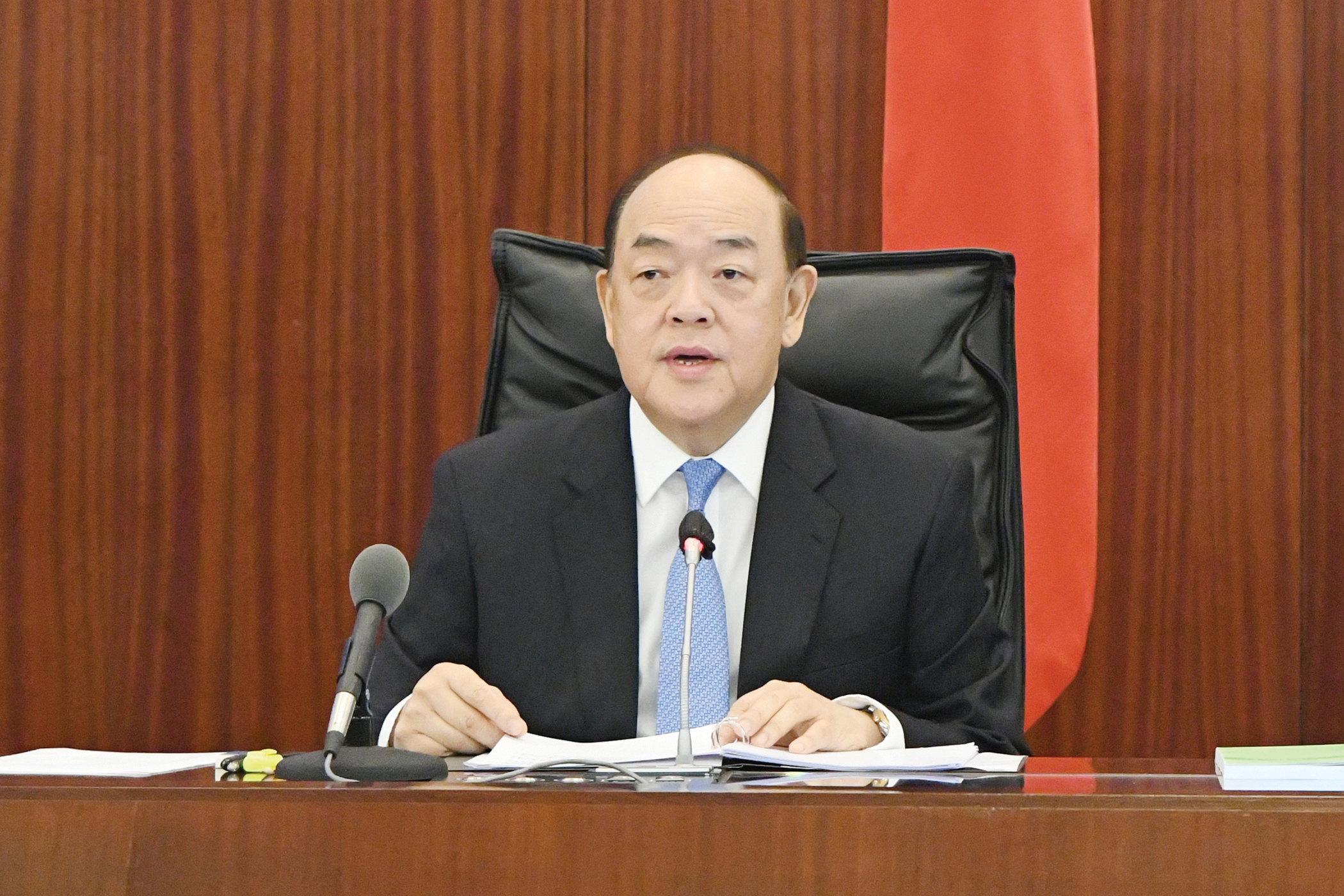
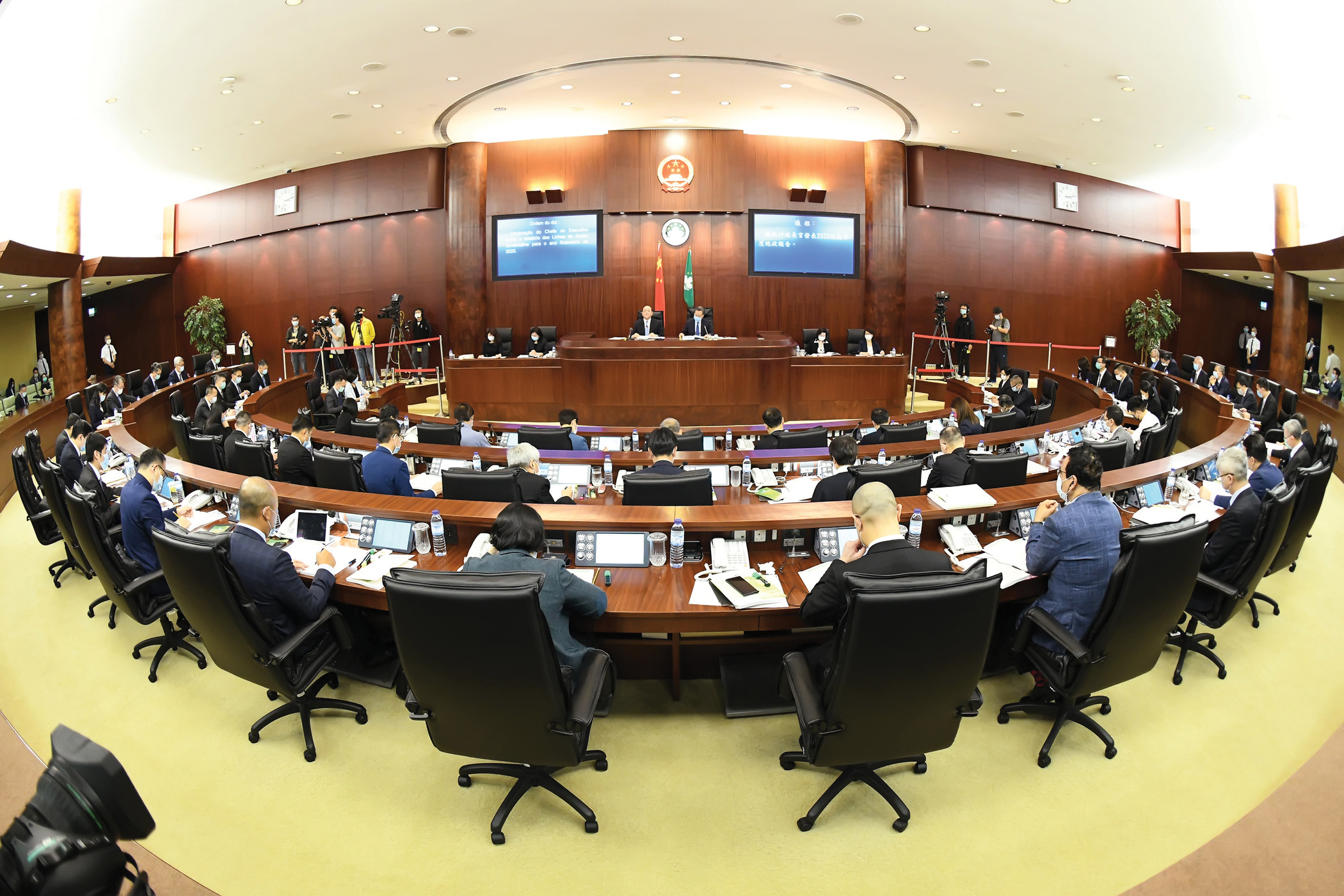
A second Macao
According to the Chief Executive, the neighbouring Hengqin island in Zhuhai will become an important platform for Macao so it can play a more active part in the Guangdong-Hong Kong-Macao Greater Bay Area (GBA), turning the island into a ‘second Macao’. The policy address, which was titled ‘Forging Ahead Towards New Horizons’, had a whole section of it dedicated to Macao’s efforts on integrating into national development and the fostering of local economic diversification.
While Macao’s land area amounts to just 32.9 square kilometres, Hengqin is around three times bigger, covering 106 square kilometres. Ho used the University of Macau (UM), which is already located on Hengqin Island, as an example because Macao leased a one-square-kilometre plot of land on the island from the Mainland city of Zhuhai for the UM campus. He said he wished that one day Hengqin could help Macao’s development.
Ho pointed out that Macao needs space for development, especially because of its aim of diversifying its economy in a short period of time. On the other hand, Ho also said there was a drawback to developing Hengqin because, he said, currently a manufacturing industry can’t be developed there – previously it has been decided that the island won’t be used for industries like this. He underlined that the government is working with the Hengqin government, hoping that the latter would provide some space for high-tech related manufacturing industries in order to promote further co-operation between Macao and Hengqin. “Macao will spare no effort in its co-operation with the Guangdong government and the Zhuhai government regarding collaboration in relation to Hengqin,” he said.
The co-operation zone in Hengqin would be positioned to develop as a free economic zone, according to the Chief Executive. It would have international standards with regards to market operations, investment and trade rules and financing systems. The effort would aim to create a business environment that would be comparable to Macao and the Macao and Guangdong authorities would work closely to create an innovative customs-clearance model and remove institutional barriers so as to promote a freer and more orderly flow of relevant resources.
While at the Legislative Assembly, Ho detailed several functions and roles envisioned for the intensive co-operation zone in Hengqin. He said the government would explore the feasibility of both developing high-tech industries and seizing the opportunities arising from the Guangzhou-Shenzhen-Hong Kong-Macao innovation and technology corridor – an initiative mentioned in the outline development plan for the Guangdong-Hong Kong-Macao Greater Bay Area – to build a high-tech hub in the Hengqin intensive co-operation zone.
Ho also said that the state key laboratories set up in Macao would play a more active role in terms of leading technological development and talent development, giving full play to Macao’s role as a platform for co-operation between China and Portuguese-speaking countries (PSCs). “With Macao’s advantages on ship registration,” he said, “Macao and Hengqin could jointly promote marine co-operation between China and Portuguese-speaking countries.”
On the topic of the PSCs, Ho said that ‘Macao and Guangdong would explore the possibilities for establishing in the intensive co-operation zone within Hengqin e-commerce and cross-boundary trade sectors serving China and Portuguese-speaking countries’. “Macao and Guangdong,” he said, “would also look at the feasibility of building an international trade centre serving China and Portuguese-speaking countries to further their economic and trade ties.” Expediting the establishment of a multicultural exchange and co-operation base with an emphasis on Chinese culture is also part of the government’s future policies. “Hengqin would encourage its film and television industries, and other cultural and creative industries, to explore Macao’s profound history and culture,” added Ho, “particularly its Chinese and Western characteristics.”
The possibility of exploring potential co-operation with Hengqin in the development of a leisure sports sector by serving as a platform for exchange and co-operation between China and Portuguese-speaking countries was also discussed. “Industries with relatively high added value and less energy consumption and pollution – such as traditional Chinese medicine, food and dietary supplements – would be a priority,” said Ho. Establishing a financial services platform between China and Portuguese-speaking countries is also part of the main objectives of the government policies.
The Chief Executive said that ‘the intensive co-operation zone within Hengqin would have facilities to promote innovative financial services and technology’. “Macao would strive to lower the threshold for Macao banks, insurance providers and other financial institutions to establish business in Hengqin in order to realise free flow of capital between Macao and Hengqin,” said Ho. “The Hengqin intensive co-operation zone would be positioned as a cross-boundary renminbi [RMB] clearing centre and Macao and Guangdong would study the feasibility of a securities market denominated and cleared in renminbi in order to promote development in modern financial services.”
The Chief Executive said Hengqin was a path to new opportunities regarding Macao’s pursuit of further development. Ho also shared his belief that Hengqin could become an open and innovative city with high-quality municipal services and sound environmental conditions. On residential and social welfare in Hengqin, he said that ‘while advancing connectivity of infrastructure between Macao and Hengqin, the government would gradually extend to Macao residents residing in Hengqin coverage regarding medical services and social security protection’. The government would also accelerate development of a residential project in Hengqin specifically for Macao people, enabling them to have access to, for instance, ‘care services for the elderly, housing, education and general healthcare services’. “The residential project would create more convenient conditions for Macao people to use Hengqin as a base either for study, employment, starting a business, retirement or residence,” he said.
Gaming matters
In a press conference held at the government headquarters after the policy address, Ho said that ‘for the time being, we [the government] do not have any plans to reduce tax’, referring to the gaming tax rate which is currently at 35 per cent. He underlined that the government would hold an international open tender for the granting of future gaming concessions in the run-up to the expiration of the city’s three gaming concessions and three sub-concessions in 2022. Ho also reaffirmed that none of the current concessions and sub-concessions will be automatically renewed in 2022. While SJM, Wynn and Galaxy are concessionaires, the Venetian Macao, MGM and Melco are sub-concessionaires.
The Chief Executive also pointed out that in the future the government would reduce ‘unnecessary’ spending and impose ‘strict’ control measures on public administration budgets. But he also said that the government will increase expenditure on large-scale activities such as the Macau Grand Prix, with the hope of attracting more tourists to Macao and further promoting the local economy. He said he hoped that the current number of 38,000 public servants had reached its ‘peak’ but he also pointed out that each year the government would still recruit ‘proportional numbers’ of new public servants. He did not elaborate any further on this point but he did underline that the current overall number of public servants would not decline, adding that the government could use secondments as a measure to fill the government departments that need more staff. Ho pointed out that the government is drafting a law on the setting up of a system of secondments.
From prioritising infrastructure projects and focusing on the structural changes taking place at the government level to encouraging Macao businesses and people to make full use of neighbouring Hengqin, the Chief Executive’s policy address covered much ground and highlighted how many immense changes Macao will see as we enter a new decade. Echoing Ho Iat Seng’s words, the next few years are set to be Macao’s ‘golden years’. And this will begin with the new measures being made by the government in relation to helping society get back on its feet following the COVID-19 pandemic. Read an overview by the government on exactly what these measures entail by scanning the QR code below…
Click here to learn all about the 2020 Policy Address
What the secretaries said…
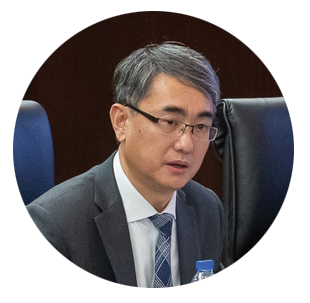
Administration and Justice
At the legislature’s hemicycle, which took place between late last month and earlier this month, five government secretaries announced policy guidelines for their respective portfolios. Secretary for Administration and Justice André Cheong Weng Chon said that the government will hold a public consultation this year on its plans to reform the civil service as many long-existing problems have been identified. Cheong, who previously headed the Commission Against Corruption, acknowledged that the civil service is ‘beset with overlapping functions’ and an ‘inadequate deployment of civil servants’, as well as ‘the difficult co-ordination and sluggish implementation of interdepartmental tasks’. He also singled out a ‘lack of clear objectives in civil service training programmes’.
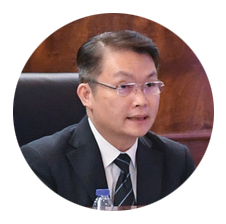
Economy and Finance
Secretary for Economy and Finance Lei Wai Nong last month reaffirmed that the government aims to launch a public consultation by the end of this year on the granting of future gaming concessions in the run-up to the expiration of the city’s three gaming concessions and three sub-concessions. “This time, the government will have more space on choosing and deciding how the gaming industry should run in the future,” he said. The city’s current gaming concessionaires are SJM, Wynn and Galaxy and its sub-concessionaires are The Venetian, MGM and Melco. Lei was quick to add that the government’s ‘ultimate aim’ is to ensure that the process will be completed by June 2022 and that there is a need to ‘redefine non-gaming elements’.
Lei also said that the government is aiming to launch a public consultation on the drafting of the city’s first-ever trade union bill in the third quarter of this year. He pledged that the government will draft a bill which will be ‘suitable for Macao’s continued development and its future needs’ after collecting residents’ opinions during the upcoming consultation. The legislature rejected a trade union bill for the 11th time in March last year. Macao is the only jurisdiction in China that does not have a trade union law.
Lei also urged civil society not to be prejudiced against the government’s policy of deepening co-operation between Macao and Hengqin. He said that Hengqin would provide Macao with sufficient land for the latter’s continued development, particularly by helping Macao diversify its industries and tackle the housing problem. He also noted that the local government has always stressed Macao’s need to integrate itself into the Guangdong-Hong Kong-Macao Greater Bay Area. He underlined that Macao’s insufficient land resources have limited its continued development for a long time.
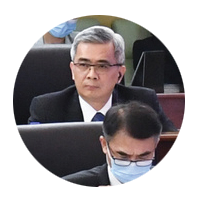
Security
Secretary for Security Wong Sio Chak said that the novel coronavirus epidemic ‘has resulted in many impacts’ on the city’s public security. He said: “The development trend of cybercrime, the significant changes in the operations of criminal organisations, the increased risk of cross-border crimes, the complexity of maritime and coastal security,
and the instability brought about by gaming-related illegal activities are posing challenges to the police’s law enforcement.”
“Moreover,” continued Wong, “the negative impact of the novel coronavirus epidemic on Macao’s economy and the life of its population, as well as various kinds of social conflicts, have resulted in many impacts on the stability of Macao’s public security and its safety landscape.” Wong said that this year, ‘Macao’s general security landscape continues to face many threats and challenges’, particularly ‘the ensuing negative impact brought about by the novel coronavirus epidemic, the increasingly serious situation concerning the surrounding security and the risk of natural disasters that have occurred in recent years’. He said these instances ‘highlight the importance and urgency of defending national security’ and Macao’s ‘public order’. He also said they highlight the importance of ‘pushing ahead with the reform’ of the city’s ‘civil protection’. And he underlined that the Macao Special Administrative Region ‘definitely’ has the constitutional, legal and national responsibility for safeguarding national security, adding that the nation’s sovereignty, security and development interests are ‘prerequisites’ for maintaining Macao’s safety, stability and prosperity.
In 2015, the government entered its first phase in a four-phase police surveillance project to install 1,620 CCTV cameras across the city. Wong said last month that the installation of the fourth phase, which was initially slated for the previous quarter, had been delayed due to the COVID-19 epidemic, adding that the government now expects this phase, which includes the installation of 800 CCTV cameras, to take place in July. He also reaffirmed that the facial recognition technology to be added to the citywide CCTV camera system will facilitate the police forces’ criminal investigations. He underlined that no cameras installed across the city will be equipped with facial recognition devices and the technology will only be installed in the back office equipment of the citywide CCTV camera system, which he said was fully in line with the law regulating the system.
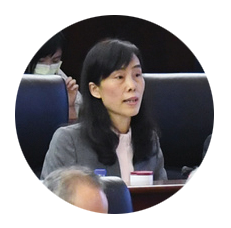
Secretary for Social Affairs and Culture Elsie Ao Ieong U | Photo by Government Information Bureau
Social Affairs and Culture
Secretary for Social Affairs and Culture Elsie Ao Ieong U said that the government will study the suitability of turning the Old Courthouse in Nam Van into the city’s new Central Library and converting the old Hotel Estoril and its adjacent swimming pool into a youth recreation and activities centre, as well as building several schools on the former greyhound racetrack in Fai Chi Kei. The government will study whether the three locations are suitable for the three projects after the publication of the government’s urban master plan in the near future.
Ao Ieong pledged that the local government will continue to closely monitor the changes in the COVID-19 epidemic in Macao and elsewhere, and ‘take necessary epidemic prevention and control measures in a timely and effective manner’. She also said that the government will increase its funding to local schools for the purchase of hygiene items and facilities, as well as strengthening its financial support to the schools that are planning large-scale or urgent renovation projects. She said that the Cultural Affairs Bureau will exempt for one year local arts and cultural groups from paying fees for using the Macao Cultural Centre. She also pointed out that the Higher Education Bureau will be merged with the Education and Youth Affairs Bureau with the aim of ‘promoting the co-ordinated development’ of education in the city. The government’s Cultural Industry Fund will be merged with the Cultural Affairs Bureau for a ‘more effective planning’ of the development of the city’s cultural sector. She said that the local government will help Macao residents who hold a Mainland residence permit to join the Mainland’s basic medical insurance scheme.
Ao Ieong said that the local government will establish a patriotic education base in Macao with the ‘unwavering’ aim of promoting the city’s ‘loving the country and loving Macao’ education, adding that the phased opening of the education base was expected to start by the end of this year. The local government’s patriotic education ‘is not just a slogan’, she said, adding that the government wants young people to ‘experience the country and Macao through their eyes and ears’ to develop ‘their passion for the country and Macao through their personal experience’. She also said that in addition to the raising of the national flag and the singing of the national anthem in local schools, the local government was also encouraging young people to participate in internships, exchanges and fact-finding trips in the Mainland so that they could gain a better understanding of the nation’s latest developments and its current governance. She said that young local people have the ability to ‘think independently’.
During the plenary session, Ao Ieong said that the local government plans to organise an international sports event every month after the COVID-19 epidemic is over. She mentioned some possible events including golf tournaments and volleyball and table tennis competitions. She also said that football matches involving teams from the Mainland, Portuguese-speaking countries and Europe could also take place in Macao.
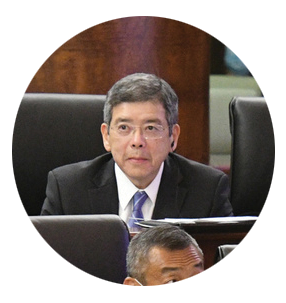
Transport and Public Works
The local government aims for a Light Rail Transit (LRT) section connecting Macao’s Cotai and Zhuhai’s Hengqin Island to get off the ground this year. Secretary for Transport and Public Works Raimundo do Rosário said that as the LRT Cotai-Hengqin section is a cross-border project, it will be constructed by a Mainland construction company. Rosário pledged that the government will invite bids this year for the construction of the LRT Seac Pai Van section, which will connect the still under-construction Cotai hospital complex – officially known as the Cotai Healthcare Complex – and the sprawling Seac Pai Van public housing estate in Coloane. The policy secretary said that although the Seac Pai Van section will only have two stations, it will still be a large-scale project as it will be 1.6-kilometres long.
Macao’s first LRT – the Taipa section – came into service in December. The section cost between MOP 10.1 billion and MOP 10.2 billion (US$1.26–1.28 billion). The 9.3-kilometre-long Taipa section, which also covers Cotai, has 11 stations. Rosário said that the government’s work in his portfolio has ‘inevitably’ been affected by the COVID-19 epidemic but stressed that all the entities under his portfolio have never stopped any of their tasks. “We continue to plan, adjust and implement our measures and projects as needed,” he said.
